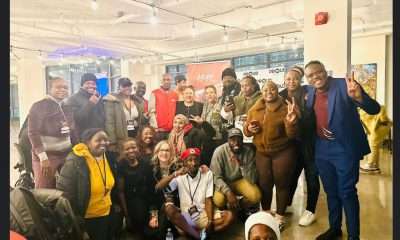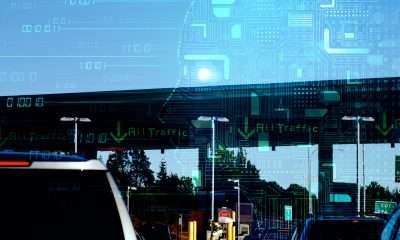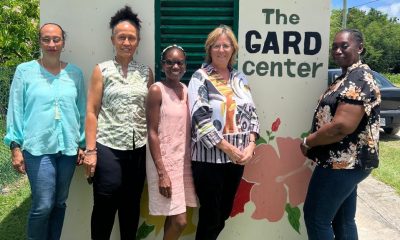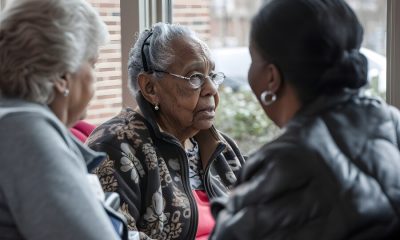Community News
15-Minute Lockdown – They are slowly introducing the New Lockdown, the New Norm
Published
2 years agoon
BY SIMONE J. SMITH
No more camping holidays,
No more weekends away,
No more visiting families that don’t live close to you,
No more choosing the school you child goes to,
All of your money, shopping, travel, entertainment, daily activities are tracked and monitored by your digital ID.
If you exceed or do not abide by the rules given to you by the government you could be denied access to everyday activities and even fined, all under the guise of conserving your carbon footprint…
“Don’t judge a situation by what is happening in that moment, let it play out and see where it goes.” David Icke
If you are happy to be surveilled 24/7, and don’t mind being locked down, controlled and told what to do then this article probably isn’t for you.
CLIMATE CHANGE, CLIMATE CHANGE, CLIMATE CHANGE…
I want you to think about how many times you have heard this phrase in the last two years. Media, our world government, oligarch’s have shifted the focus off COVID-19, and now they are priming us on a daily basis with this forced notion of climate change.
Priming is a phenomenon in which exposure to one stimulus influences how a person responds to a subsequent, related stimulus. These stimuli are often conceptually related words or images. Repeating the phrase “climate change,” activates and influences how the person responds to hearing it. Yes, they have made climate change a buzzword, something that we all have to take very seriously, like COVID-19. What they are now doing is utilizing the same techniques of fear, which will turn into intimidation if we, the people, begin to stand up against climate change.
I want you to take this article very seriously, because we are about to be swept up into a future that resembles “The Hunger Games,” where people are isolated into quadrants, and the freedom of movement that we once knew will be vanquished. We have been warning about this for over a year, and surprise, surprise, they are slowly introducing the new lockdown, the new norm.
Don’t get too comfortable with your new Normal; Climate Lockdowns might be on the way. (https://torontocaribbean.com/dont-get-too-comfortable-with-your-new-normal-climate-lockdowns-might-be-on-the-way/)
Published 11 months ago on March 21st, 2022, Toronto Caribbean Newspaper
In this article, I provided a warning for our community about what might be for us in the future.
In November of 2021, India’s Supreme Court called for a lockdown in the capital, New Delhi. Supreme Court Justices ordered authorities to halt all nonessential travel on roads in the national capital region. They also told them to close offices in the area, shifting tens of millions of people to work from home. It appears that something like this could be happening in more countries around the world.
In November 2020, the Red Cross made the claim that climate change was a bigger threat than COVID and should be confronted with “The same urgency.” Of course, the one and only Bill Gates recently demanded that something be done to prevent climate change, claiming it will be worse than the pandemic.
I want to bring attention to a recent interview that Bill Gates did with BBC Journalist Amol Rajan. In the interview, he responds to criticism that he uses a private plane even though he has urged political and business leaders to act aggressively against climate change. Gates replied that he more than offsets his own greenhouse gas emissions by paying for the removal from the atmosphere of carbon dioxide, the most prevalent greenhouse gas causing global warming.
“Well, I buy the gold standard, of funding Climeworks, to do direct air capture that far exceeds my family’s carbon footprint,” Gates said.
BILL GATES – Because he is so rich he is allowed to fly in his private jets wherever he wants. According to him.
Only the rich ‘doing it for the good of mankind’ aren’t forced to follow the rules. This is the new equity you are being asked to swallow.
— Bernie’s Tweets (@BernieSpofforth) February 8, 2023
Gates’ argument is that his own investment in clean energy and other environmental and public health programs warrants his travel for those purposes.
Hmmmm! So, because you are rich, rules do not apply to you, but they apply to everyone else. I want readers to keep this in mind as you read the rest of this article
“Unfortunately, there are no vaccines for climate change.” Preparation for permanent climate lockdowns! (https://torontocaribbean.com/unfortunately-there-are-no-vaccines-for-climate-change-preparation-for-permanent-climate-lockdowns/)
Published 4 months ago on October 15th, 2022
In this article, I refer to the World Economic Forum and their claims that if we take the measures needed (climate lockdowns, less private car ownership, less meat), by 2030, our CO2 emissions will be greatly reduced? Meat on your dinner table will be a rare sight. Water and the air you breathe will be cleaner and nature will be in recovery. They want to take lockdown compliance and then move that over to climate change compliance. They want climate change lockdowns. That’s what’s coming.
At the end of the article, I asked readers, are you prepared?
Carbon Allowances; you can only do so much
Here we are in February 2023, and much of what we have reported is slowly coming true. Another priming word that is being propagated is carbon allowances. What is a carbon allowance you ask? Well, how it works is pretty much the same way allowances worked when some of us were children. Everyone starts with a baseline amount. Right now, that could cover how much electricity you use at home, travel budgets, and the impact of your food, but if you want to take a long flight, or have a big fancy car or something else that pushes out a lot of carbon, you may need more credits than you initially get.
(Mastercard unveils new Carbon Calculator tool for banks globally, as consumer passion for the environment grows – https://www.mastercard.com)
Trading comes in when your allotment doesn’t exactly fit your lifestyle. If a household isn’t using their full allotment, they can sell or trade to those who need more credits. Typically, people with lower incomes have lower carbon footprints than their high-income counterparts.
This concept has been brewing for a while; the introduction of personal carbon allowances (PCAs), a mitigation policy proposal was developed in the 1990s. This policy aimed to link personal action with global carbon reduction goals. A PCA scheme would entail all adults receiving an equal, tradable carbon allowance that reduces over time in line with national targets.
In its original design, the allowance could cover around 40% of energy-related carbon emissions in high-income countries, encompassing individuals’ carbon emissions relating to travel, space heating, water heating and electricity. Allowances were envisioned to be deducted from the personal budget with every payment for transport fuel, home-heating fuels and electricity bills.
Think about it readers; our governments are buying into an idea to limit your ability to move freely. That is right, the constitutional right to move around the country will be severely restricted.
How are they going to do this you ask?
The Solution; Lockdowns for all
One of the biggest urban ideas to emerge from the pandemic is the idea of the 15-minute city or 15-minute neighbourhood. The concept was developed by French urbanist Carlos Moreno, and they refer to a place where all the necessities of daily life – shops, schools, workplaces, doctor’s offices, parks, libraries, restaurants and other amenities – are located in a short 15-minute walk or bike ride from home. In this way, each neighbourhood becomes an ‘isochrone’, an area that can be explored within a given time, giving all residents access to their needs a convenient walk away.
They promote that workers can live near their offices or co-working spaces, eliminating the commute. Anyone can walk to a small, nearby park without having to hunt for parking spaces. Community building will benefit too: parceling a city into smaller units makes it far more manageable from a social point of view.
15-minute cities have been in the planning for decades but in actual fact the first mention of smart cities on the WEF site can be traced back to 2016 in an article called “4 ways smart cities will make our lives better.”
The world is buying into 15-minute Cities
Various cities around the world have begun to embrace the 15-minute city approach. For instance, Melbourne is proposing self-contained communities within an 800-meter radius. Portland’s Climate Action Plan calls for more vibrant neighbourhoods in which 90% of the residents can walk, or bike to fulfill their daily needs.
The most vocal proponent of the concept remains Paris, where the concept originated. Its mayor Anne Hidalgo has been championing the “Ville du quart d’heure,” since early 2020, and has limited car speed to 30 kilometers per hour on many streets; automobiles have been banned along the Seine one Sunday each month; and plans to include a biking lane on every street by 2024 is also in the works.
Japan (The Woven City)
Toyota Motor Corporation started construction in 2021 on a 175-acre smart city at the base of Japan’s Mount Fuji, about 62 miles from Tokyo. The city, which Toyota has dubbed the “Woven City,” is expected to function as a testing ground for technologies like: robotics, smart homes, and artificial intelligence.
These residents, who are expected to move into the Woven City within five years, will live in smart homes with in-home robotics systems to assist with daily living and sensor-based artificial intelligence to monitor health and take care of other basic needs.
United Kingdom
15-minute city zones have been proposed by Oxford City Council as part of the Local Plan 2040 have garnered significant controversy. The plan, which will see traffic filters installed on six roads as part of a £6.5m trial, is set to commence in 2024. Under these new filters, residents will be able to drive freely around their own neighbourhoods but will be fined up to £70 for driving into other neighbourhoods through the filters. The plan’s aim is to create neighbourhoods in Oxford where ‘essential’ facilities are accessible by a walking distance of up to 15 minutes.
199 Cities in Canada have Signed on to 15-Minute Cities
What is happening quietly across Canada, without a whisper on mainstream media is the implementation of 15-minute cities. That’s right people, cities across the country will have this concept become part of your regular life. Let’s take a look at some cities that have signed on.
Innisfil (The Orbit Vision)
The town of Innisfil The Orbit Vision has been developed with both the existing and future communities in mind to ensure that Innisfil grows and continues to be a great place to live. The below five goals will be at the heart of the Orbit Potential & Innovation Plan (OPIP) and will be reflected in the community to come. Creating 15-minute neighbourhoods designed with a people-first approach and integrated greenspaces. They claim it will make day-to-day life easier using technology and Smart Cities concept without losing the focus on good neighbourhood design
Ottawa (Five Big Moves)
Ottawa introduced the “Five Big Moves.” On their official website they state that the principles of 15-minute neighbourhoods are integral to the strategic directions contained in Ottawa’s Draft New Official Plan. The concept of 15-minute neighbourhoods supports a variety of objectives relating to intensification, economic development, energy and climate change (buzzword), gender equity, and culture. Additionally, planning for 15-minute neighbourhoods represents a critical means of embedding health resiliency in planning in order to achieve healthier, more inclusive communities.
Edmonton (Community of Communities)
Their district planning is a multi-year project to build The City Plan’s “community of communities”—small towns in our big city, where people can meet many of their daily needs within 15 minutes from where they live.
Edmonton 🇨🇦 City Councillor with he/him Twitter pronouns, @AndrewKnack gives enthusiastic speech advocating 15 minute cities. pic.twitter.com/FHQwLm9iSL
— Rowan (@canmericanized) February 12, 2023
Infrastructure Canada
Infrastructure Canada has an interactive map of the communities that applied to the Smart Cities Challenge. When you visit the website, you can click on the markers on the map to see more information about the communities and their applications.
What is scary is that there are already 199 cities across Canada who have signed up to relinquish their freedoms and once again acquiesce to higher powers.
There is a famous saying which says that “We only retain the freedoms for which we fight.” Eventually, we are going to lose our freedoms if we do not take them seriously. Our freedom is in danger of being hijacked by the so-called political parties, ideologues, corporate groups, and those who are truly running the world from the shadows. We thought we had gained our freedom from oppressors and monarchs in the previous century, but did we really?
The new face of tyranny is so compact, so well organized, and we as Canadians must STAND UP now and defend our most basic freedoms. We, the People need to take heart and be courageous and stand against this kind of oppression.
You can do this by writing, or calling into your local MP’s and saying, “NO TO 15-MINUTE CITIES.” Let’s not wait until it is too late.
References:
The 15-minute city meets human needs but leaves desires wanting. Here’s why – https://www.weforum.org/agenda/2021/11/15minute-city-falls-short/
Smart Cities Challenge Map Of Applicants (Canada) – https://www.infrastructure.gc.ca/sc-vi/map-applications.php
Personal carbon allowances revisited – https://www.nature.com/articles/s41893-021-00756-w
The Orbit Vision (Innisfil, ON) – https://innisfil.ca/en/building-and-development/orbit-vision.aspx
District Planning (Edmonton, AB) – https://www.edmonton.ca/city_government/urban_planning_and_design/district-planning
We, as humans are guaranteed certain things in life: stressors, taxes, bills and death are the first thoughts that pop to mind. It is not uncommon that many people find a hard time dealing with these daily life stressors, and at times will find themselves losing control over their lives. Simone Jennifer Smith’s great passion is using the gifts that have been given to her, to help educate her clients on how to live meaningful lives. The Hear to Help Team consists of powerfully motivated individuals, who like Simone, see that there is a need in this world; a need for real connection. As the founder and Director of Hear 2 Help, Simone leads a team that goes out into the community day to day, servicing families with their educational, legal and mental health needs.Her dedication shows in her Toronto Caribbean newspaper articles, and in her role as a host on the TCN TV Network.

You may like
-


“We want 9-8-8 to become as familiar as dialing 9-1-1,” 9-8-8 Celebrates one year serving the community
-


The health disaster caused by the tobacco industry is still ongoing and needs immediate attention
-


The world says goodbye to the Calypso Lion, Dennis James Sr
-


Has the public not made enough noise about the condition of foods offered to them?
-


Newcomers and refugees in Canada call for more resources to end gender-based violence
-


George Brown College Alumni lay the foundation for lasting legacy in Jamaica
1 Comment
Leave a Reply
Cancel reply
Leave a Reply
Community News
“We want 9-8-8 to become as familiar as dialing 9-1-1,” 9-8-8 Celebrates one year serving the community
Published
4 hours agoon
December 26, 2024
BY SIMONE J. SMITH
The holiday season, a time often associated with joy and celebration, can paradoxically trigger a decline in mental well-being for many. Coupled with the ongoing pressures of inflation, rising crime rates, and the abrupt shift of daylight savings time, particularly in northern regions, these factors can create a perfect storm for individuals struggling with their mental health.
Suicide, a tragic reality, knows no boundaries, impacting people of all ages and backgrounds. In Canada alone, a staggering average of 4,500 lives are lost to suicide each year, translating to approximately 12 individuals per day. The impact of each suicide extends far beyond the individual, leaving a trail of grief and devastation among family, friends, and communities.
On November 30th, 2023, Canada launched 9-8-8 Suicide Crisis Helpline. It is for anyone thinking about suicide, feeling hopeless, or like they are struggling to cope. The Centre for Addiction and Mental Health (CAMH) in Toronto, Canada’s largest mental health teaching hospital, leads and coordinates delivery of 9-8-8 nationwide. 9-8-8 is funded by the Government of Canada, through the Public Health Agency of Canada.
A growing network of nearly 40 experienced local and national crisis line partners across the country provide culturally appropriate, lifesaving supports to people who call or text the helpline.
Over the past year, 9-8-8 crisis responders have answered more than 300,000 calls and texts to the national helpline. 9-8-8 answers an average of almost 30,000 calls and texts per month – approximately 1,000 calls and texts per day. In Ontario, 9-8-8 responders answer an average of over 12,000 calls and texts per month (more than 135,000 from the launch to October 31st, 2024).
The goal of the three-digit helpline is to prevent suicide by making it as simple as possible for people to get the help they need, when they need it most. 9-8-8 provides urgent, live support by phone and text to people in every province and territory across the country in English and French, 24/7, every day of the year.
Last week, I had a chance to speak with Nika Khossravi, 9-8-8 Crisis Responder, and she shared with me her reason for becoming a responder, and the importance of 9-8-8.
“Last year I experienced the loss of a friend to suicide,” Nika shares, “When I was grieving the loss, I did a lot of reflection, and I realized that I did not have the tools to assist my friend. I dug deep and volunteered and learned a lot. What many of us don’t take into consideration is how suicide affects survivors of suicide. We don’t like to say suicide is contagious, but sometimes it becomes more of a reality, especially when someone close to you has committed suicide.”
“What are the biggest challenges you anticipate in ensuring equitable access to the 9-8-8 helpline for all Canadians, including those in remote, rural, and underserved communities,” I inquired?
“It serves every single city in Canada. It is the same as 9-1-1. Let’s be honest, when you are in crisis, you are not thinking about long drawn-out numbers. We want 9-8-8 to become as familiar as dialing 9-1-1,”
“Are there mechanisms for seamless referrals and follow-up care?”
“Responders offer follow calls within 24 hours, and some are able to do referrals to local distress centres. 211 is one of the resource databases that we can provide for them.”
9-8-8 also offers support and advice for people who are worried someone they know may be considering suicide. Whatever you are going through, you don’t have to face your problems on your own. 9-8-8 responders are here to listen. No one who calls or texts 9-8-8 will be turned away. Everyone who contacts 9-8-8 will be assessed for suicide risk.
“What are the initial expectations and long-term goals for the 9-8-8 helpline in terms of reducing suicide rates and improving mental health outcomes for Canadians?”
“We want people to be aware. We are a resource to those who think someone in their lives might be thinking about suicide. We want 9-8-8 to be as familiar to Canadians as 9-1-1.”
By texting or calling 9-8-8, people can connect with a responder who’s ready to
listen and trained to help. 9-8-8 responders work with callers and texters to explore ways to cope when things are overwhelming and find a path to safety. Responder training is informed by evidence, best practices and engagement with organizations representing populations most affected by suicide to ensure that anyone, anywhere, can access the support they need.
For more information and to receive the latest updates, please visit www.988.ca or connect with them on our social media platforms:
Twitter: @988Canada
Facebook: 988Canada
Instagram: @988Canada
LinkedIn: 988Canada
Community News
The health disaster caused by the tobacco industry is still ongoing and needs immediate attention
Published
4 hours agoon
December 26, 2024By
Paul Junor
BY PAUL JUNOR
The announced lawsuit seeking $500 billion against the tobacco companies could potentially be settled. The Canadian Cancer Society (CCS) issued a press release on October 18th, 2024, in which it expressed reservations. The Ontario government is supportive, but there have been mixed reactions from others.
The proposed lawsuit would dispense the following:
- $24.7 billion over time to provinces and territories, including $6.3 billion up front, and the remainder paid out as a percentage of tobacco company profits, including 85% of net after-tax profits in the first five years, and then 80% declining to 70% in subsequent years, until the $24.7 billion is paid
- $4.1 billion to the Quebec class action plaintiffs
- $2.5 billion to individual victims across Canada beyond the Quebec class action plaintiffs
- $1.0 billion to a Foundation to fund research for the diagnosis and treatment of tobacco-related disease.
Rob Cunningham, lawyer for the CCS and Senior Policy Analyst states, “The approach in the proposed settlement falls massively short and fails to protect the future health of Canadians properly. How can such an approach possibly be justified when we continue to have millions of Canadians who smoke each year and tobacco remains the leading cause of cancer death? This settlement fails to support public health efforts to reduce smoking.”
Cunningham is supportive of the $1 billion funding, which will go towards the foundation independent of the government but expressed concerns that it will not be involved in proactive measures such as: smoking cessation initiatives, awareness campaigns, or public health programs.
Cunningham would like to see specific changes before approval. He notes, “The foundation must have the ability to fund a full range of initiatives to reduce tobacco use, such as smoking cessation and community programs, among others. Moreover, as in the U.S, the settlement in Canada should contain policy measures to reduce tobacco use such as banning remaining tobacco promotion and should require public disclosure of secret tobacco company internal documents.”
Some of the data presented by Canada Cancer Society include:
- Smoking is the leading cause of disease and death in Canada with 16,000 deaths in Ontario and 46,000 in Canada
- The rate of smoking is 11.4% for age 18 and older according to 2023 stats
- About 3.6 million Canadians are smokers
The Canada Cancer Society highlights some of the wrongful actions of the tobacco industry such as:
- Marketing to underage teenagers
- Advertising to women with themes of slimness and fashion
- Denying that smoking caused cancer and other diseases
- Failing to warn consumers adequately
- Using misleading advertising, including for so-called “light” and “mild” cigarettes
- Lobbying aggressively against tobacco control laws
Cunningham states, “Without investing in significant measures to reduce tobacco use, this proposed settlement misses the very intention of the lawsuits in the first place, which is to curtail the damages caused by the tobacco industry. The health disaster caused by the tobacco industry is still ongoing and needs immediate attention, which this proposed settlement fails to do. This is a deal that won’t reduce smoking.”
The three major tobacco companies in Canada include:
- Imperial Tobacco Canada Ltd. (owned by British American Tobacco)
- Rothmans, Benson & Hedges Inc. (owned by Philip Morris International)
- JTI-Macdonald Corp (owned by Japan Tobacco)
Gar Mahood of the Campaign for Justice on Tobacco Fraud acknowledged the settlement is a “Hollow victory. The settlement went from $500 billion in claimed damages (the costs to the health care system for treating smoking-related illness) to just over $24.7 billion. It’s a financial cave-in that will be paid for by current addicted smokers, the most at-risk group in the proposed settlement, and youth who will become addicted.”
“It is a meaningful first step in acknowledging decades of harm,” states Jessica Buckley, President and CEO at the Lung Health Foundation (LHF) notes further, “But financial restitution can’t make up for the loss of life. It can’t make up for the experiences of Canadians who have suffered through lung cancer and COPD. It’s not enough for people who are struggling to breathe right now.”
“It is crucial to ensure that more resources are allocated to lung health prevention programs, research and education efforts.”
She is not sure if the funds will go directly into practical steps. “LHF is pushing fit a Smoke-Free Generation, a move that if enacted, would protect youth from addiction by ensuring that youth born after a certain date would never legally become of age to purchase tobacco products.”
Jacob Shelley, co-director of the Health Ethics, Law and Policy lab at Western University shares that he is pleased that plaintiffs will receive restitution after five years of going through the courts. He states, “It’s not a meaningful individual victory in the sense of like a big payout, but it’s meaningful and there is going to be an opportunity for collection on this claim, which started decades ago, and that there is recognition and an imposition of liability for the failure to warn about the risks associated with the use of this product.”
Community News
The world says goodbye to the Calypso Lion, Dennis James Sr
Published
4 hours agoon
December 26, 2024
BY MICHAEL THOMAS
Three-time Canadian Calypso monarch and Saint Lucian-born Mr. Dennis James Sr. has left us. Uncle Dennis as would sometimes call him was an extremely passionate performer. Anyone who attended a Calypso tent where Dennis James sang could testify to this. He was a reticent brother by nature but make no mistake when he hit the stage you knew it was showtime.
Always dressed to the teeth, Dennis left no stone unturned musically. He was not just a Calypso singer, Dennis touched almost every genre musically from: Soca, Calypso to RnB, and more. Every song Dennis James did he brought his fiery touch to it like a stamp.
James was crowned Canadian Calypso monarch first in 2001, then 2002, and 2006. From the day James touched down in Toronto to perform as a Calypso artist, he was loved. Some artists have to grow into that love, the audience gave Dennis that package naturally.
With songs like “West Indians Unite,” “Words I Did Not Say,” “Nothing to Declare,” “The Thunder,” and “Thank You Toronto,” it is said that as a Calypso artist, if you knew you were competing against Dennis James, you better do your homework.
One of the founding members of the Calypso organization here in Toronto and artist Juno D Kanhai aka Juno D’ Lord remembers Dennis James in two words as a “Great crooner.”
Seven-time Canadian Calypso monarch Tara Woods (aka Macoomere-Fifi) told me, “I called him Mr. Toronto. From the time Dennis James landed in Toronto, he was loved by everyone. He was always grateful for the love, and very shy about his talent.”
“Dennis may have looked unassuming, that is until he hit the stage. I will always remember Dennis onstage with that smile that is all his own, and the vocal explosion when he feels the audience’s love.”
“You had to be afraid,” she said. “Dennis was one of the guys you had to watch as a competitor. You could not take him lightly. He has left us a legacy. Rest in peace Mr. T.O.”
I spoke to five-time Canadian Calypso monarch Bryan Thornhill (aka “Structure”) who competed against Dennis in the Calypso arena, “I first met Dennis in 2003 in the Calypso finals. Even though we were fierce competitors we had that admiration for each other’s work. His strong voice and renditions made him a formidable force and added color to the Kaiso mosaic. My deepest condolences to his family. He will always be remembered. May he Rest in Peace!”
Calypso Monarch and Soca king Joel Davis (aka “Connector”) had this to say of James. “He was a giant in the business, a humble but serious man who I considered a cultural ambassador. He executed his vocal range with a vengeance.”
Five-time Canadian Calypso monarch Michael Moore (aka the Lord Beginner) also weighed in on his memory of Dennis James. “What I liked about him was his aggressive nature on stage. Even though we performed in the same tent I told myself, I better watch him. James was smooth, Dennis performed nicely, and he knew how to get the crowd involved in the Calypso. He was a fierce competitor, and I liked him, but you know me, even though we were in the same camp I have no friends when it came to the competition, but I am very sympathetic about his passing.”
One of the things I have learned as an artist from Dennis is to document my work. James would post songs that he recorded in the 70s as well as his latest work, both his music and the pictures from that era he kept. Not many artists have that mindset.
Even though James has lived in the US and Canada he has never forgotten his Saint Lucian roots going back from time to time and even competing in the Island’s national Calypso competition.
I have always liked how Dennis James packaged and presented himself as an artist. He took his craft seriously and I respect that. On behalf of the Toronto Calypso fraternity, I extend condolences to his wife and family. Dennis James, may you fly high King. You will be fondly remembered.

“We want 9-8-8 to become as familiar as dialing 9-1-1,” 9-8-8 Celebrates one year serving the community

The health disaster caused by the tobacco industry is still ongoing and needs immediate attention

The world says goodbye to the Calypso Lion, Dennis James Sr

Has the public not made enough noise about the condition of foods offered to them?

Newcomers and refugees in Canada call for more resources to end gender-based violence

George Brown College Alumni lay the foundation for lasting legacy in Jamaica
YOGA: Surya Namaskar (Sun Salutation) for sufferers of hypertension or heart disease
Kemtek Development launches new exclusive gated community in Jamaica!

Tourism-Related Live Streaming – The Manifold Ways it Can Create a Buzz for a Destination

Ravi’s West Indian Grocery – Fresh Products Weekly Straight from Guyana!

Send groceries to Jamaica in a flash, how? GroceryList Jamaica

ASA Meats & West Indian Groceries – Serving Freshness & Quality to the Community

Nadine Sutherland – A woman who continues to reinvent herself

Knia Singh – Light Up The Darkness

Spragga Benz – Light Up The Darkness

Kyle Kemper – Light Up The Darkness

David Icke – Light Up The Darkness

Ohio’s Bill 248 and Dr. Sherri Tenpenny’s compelling testimony
Trending
-

 Community News1 week ago
Community News1 week agoCan AI truly grasp the nuances of culture, history, and the unique spirit of a country?
-

 Community News1 week ago
Community News1 week agoDigital Double-Edged – We cannot allow a fragile digital system to control when and how you can travel
-

 Community News1 week ago
Community News1 week agoTo navigate complex challenges: Caribbean governments, corporations, and organizations need innovative solutions
-

 Community News1 week ago
Community News1 week agoLights Out! United Boxing Promotions shocks fans with unstoppable knockouts!
-

 Community News1 week ago
Community News1 week agoPatrick Parson remembered for his: Legacy, impact and influence in the artistic community in Toronto
-

 Community News1 week ago
Community News1 week agoOwnership Matters with ACBN, “Just Like Family” Providing essential home care services for seniors
-

 Classic Man7 days ago
Classic Man7 days agoYoung and upcoming Caribbean comedian Dale Elliott Jr.
-

 Classic Man7 days ago
Classic Man7 days agoRico King: Filmmaker, community activist and entrepreneur who brings raw Black stories to the big screen








Steven Berge
March 12, 2023 at 8:57 pm
Guess who will get to decide what services you have access to. The rule by wealth system will not end itself, we have to organize massive protests and general strikes with a clearly written demand to end it once and for all people.